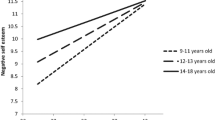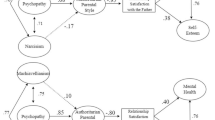Abstract
The purpose of this study was to measure and compare differential effects of perceived maternal and paternal acceptance of adult sons and adult daughters during childhood on their current psychological adjustment. The sample consisted of 200 young adults (100 males and 100 females) from Bangladesh. Measures used were Adult versions of the Parental Acceptance and Rejection Questionnaire for Mothers and Fathers (Adult PARQ: Mothers and Fathers), and Adult version of the Personality Assessment Questionnaire (Adult PAQ). Results showed that both maternal and paternal acceptance have significant independent effects on adult sons’ psychological adjustment, and only paternal (not maternal) acceptance has significant independent effect on adult daughters’ psychological adjustment. Paternal acceptance accounts for greater variability in adult sons’ and adult daughters’ psychological adjustment than maternal acceptance. Results also showed that parental gender has significant interaction effect on the adult daughters’ (not adult sons’) psychological adjustment. Results further showed that adult daughters reported significantly greater maternal and paternal acceptance and higher psychological adjustment than adult sons.
Similar content being viewed by others
References
Brewin, C. R., Andrews, B., & Gotlib, I. H. (1993). Psychopathology and early experience: A reappraisal of retrospective reports. Psychological Bulletin, 113, 82–98.
Carrasco, M. A., Holgado, F. P., & del Barrio, V. (2013). Effects of parental interpersonal power/prestige and psychological adjustment of Spanish youths. Paper presented at the Fourth International Congress on Interpersonal Acceptance and Rejection, Chandigarh, India, January 10–13.
Carrasco, M. A., & Rohner, R. P. (2012). Parental acceptance and children’s psychological adjustment in the context of power and prestige. Journal of Child and Family Studies,. doi:10.1007/s10826-012-9675.0.
Comunian, A. L., & Gielen, U. P. (1999). Parental acceptance and rejection: A study in Italian culture. Unpublished manuscript.
Cournoyer, D. E. (1988). The unloved feeling: Coping with perceived maternal rejection. Unpublished Ph. D. dissertation, University of Connecticut.
Cournoyer, D. E., & Hirao, K. (2008). Differential contribution of maternal and paternal rejection to children’s psychological adjustment: A structured analysis. Unpublished paper.
Cournoyer, D. E., & Rohner, R. P. (1996). Reliability of retrospective reports of perceived maternal acceptance–rejection in childhood. Psychological Reports, 78, 147–150.
Gomes, R., & Rohner, R. P. (2011). Tests of factor structure and measurement invariance in the United States and Australia using the adult version of the parental acceptance–rejection questionnaire. Cross-Cultural Research, 45, 267–285.
Ibrahim, M. (2010). Effects of parents’ power and prestige on children’s psychological adjustment in Kuwait. Paper presented at the third international congress on interpersonal acceptance and rejection, University of Padua, Italy, July 28–31.
Khaleque, A. (2013). Perceived parental warmth and affection, and children’s psychological adjustment, and personality dispositions: A meta-analysis. Journal of Child and Family Studies, 22, 297–30611.
Khaleque, A., & Rohner, R. P. (2002). Perceived parental acceptance–rejection and psychological adjustment: A meta- analysis of cross-cultural and intracultural studies. Journal of Marriage and Family, 64, 54–64.
Khaleque, A., & Rohner, R. P. (2002). Reliability of measures assessing the pancultural association between perceived parental acceptance–rejection and psychological adjustment: A meta-analysis of cross-cultural and intracultural studies. Journal of Cross-Cultural Psychology, 33, 87–99.
Khaleque, A., & Rohner, R. P. (2012). Pancultural associations between perceived parental acceptance and psychological adjustment of children and adults: A metal analytic review of worldwide research. Journal of Cross-Cultural Psychology, 43, 784–800.
Khaleque, A., & Shirin, A. (2014). Influence of perceived parental power and prestige on parental acceptance and psychological adjustment of adult offspring. Bangladesh Journal of Psychology, 20, 1–14.
Lila, M., Gracia, F., & Gracia, E. (2007). Perceived paternal and maternal acceptance and children’s outcomes in Colombia. Social Behavior and Personality, 35(1), 115–124.
Ripoll-Nunez, K., & Alvarez, C. (2008). Perceived intimate partner acceptance, remembered parental acceptance, and psychological adjustment among Colombian and Puerto Rican youths and adults. Cross-Cultural Research, 42, 23–34.
Rohner, R. P. (1975). They love me, they love me not: A worldwide study of the effects of parental acceptance and rejection. New Haven, CT: HRAF Press.
Rohner, R. P. (1980). Worldwide tests of parental acceptance–rejection theory: An overview. Behavior Science Research, 15, 1–21.
Rohner, R. P. (1986). The warmth dimension: Foundations of parental acceptance–rejection theory. Beverly Hills, CA: Sage Publications Inc.
Rohner, R. P. (2005). Parental acceptance–rejection/control questionnaire (PARQ/Control): Test manual. In R. P. Rohner & A. Khaleque (Eds.), Handbook for the study of parental acceptance and rejection (pp. 137–186). Storrs, CT: Rohner Research Publications.
Rohner, R. P. (2014). PARTheory gets a new name: Interpersonal acceptance rejection theory (IPARTheory). Interpersonal Acceptance, 8(3), 6.
Rohner, R. P. (2014). Parental power and prestige moderate the relationship between perceived parental acceptance and offspring’s psychological: Introduction to the international father acceptance–rejection project. Cross-Cultural Research,. doi:10.1177/1069397114528295.
Rohner, R. P., & Britner, P. A. (2002). Worldwide mental health correlates of parental acceptance–rejection: Review of cross-cultural and intracultural evidence. Cross-Cultural Research, 36, 16–47.
Rohner, R. P., & Brothers, S. A. (1999). Perceived parental rejection, psychological maladjustment, and borderline personality disorder. Journal of Emotional Abuse, 1, 81–95.
Rohner, R. P., & Chaki-Sircar, M. (1988). Women and children in a Bengali village. Hanover, NH: University Press of New England.
Rohner, R. P., & Cournoyer, D. E. (1994). Universals in youth’s perceptions of parental acceptance and rejection: Evidence from factor analyses within eight sociocultural groups worldwide. Cross-Cultural Research, 28, 371–383.
Rohner, R. P., & Khaleque, A. (2005). Personality assessment questionnaire (PAQ): Test manual. In R. P. Rohner & A. Khaleque (Eds.), Handbook for the study of parental acceptance and rejection (4th ed., pp. 187–225). Storrs, CT: Rohner Research Publications.
Rohner, R. P., & Khaleque, A. (2008). Relations between partner acceptance and parental acceptance, behavioral control, and psychological adjustment among heterosexual adult women in the U.S. In F. Columbus (Ed.), Family relations: Behavioral, psychological, and sociological aspect (pp. 187–197). New York: Nova Science Publishers Inc.
Rohner, R. P., Khaleque, A., & Cournoyer, D. E. (2014). Parental acceptance–rejection theory, methods, evidence, and implications. Retrieved in June 30, 2014 from University of Connecticut Center for the Study of Interpersonal Acceptance and Rejection website at www.csiar.uconn.edu.
Rohner, R. P., Khaleque, A., Riaz, M. N., Khan, U., Sadeque, S., & Laukkala, H. (2005). Agreement between children’s and mothers’ perceptions of maternal acceptance and rejection: A comparative study in Finland and Pakistan. Ethos, 33, 367–377.
Rohner, R. P., & Veneziano, R. A. (2001). The importance of father love: History and contemporary evidence. Review of General Psychology, 5, 382–405.
Rohner, R. P., & Veneziano, R. A. (2008). International father acceptance–rejection project. Paper presented as a part of a symposium at the thirty seventh annual meeting of the society for cross-cultural research, New Orleans, LA, USA.
Tkalic, R. G. (2010). Relations between fathers’ power, prestige, acceptance, and involvement, and psychological adjustment. Paper presented at the third international congress on interpersonal acceptance and rejection, University of Padua, Italy, July 28–31.
Veneziano, R. (2008). The relative importance of fathers versus mothers for offspring’s behavior: Theory and implications for future research. Paper presented at the second international congress on interpersonal acceptance and rejection, University of Crete, Rethymno, Greece, July 3–6.
Wentzel, K. R., & Feldman, S. S. (1996). Relations of cohesion and power in family dyads to social and emotional adjustment during early adolescence. Journal of Research on Adolescence, 6, 225–244.
Author information
Authors and Affiliations
Corresponding author
Rights and permissions
About this article
Cite this article
Sultana, S., Khaleque, A. Differential Effects of Perceived Maternal and Paternal Acceptance on Male and Female Adult Offspring’s Psychological Adjustment. Gend. Issues 33, 42–52 (2016). https://doi.org/10.1007/s12147-015-9147-0
Published:
Issue Date:
DOI: https://doi.org/10.1007/s12147-015-9147-0




